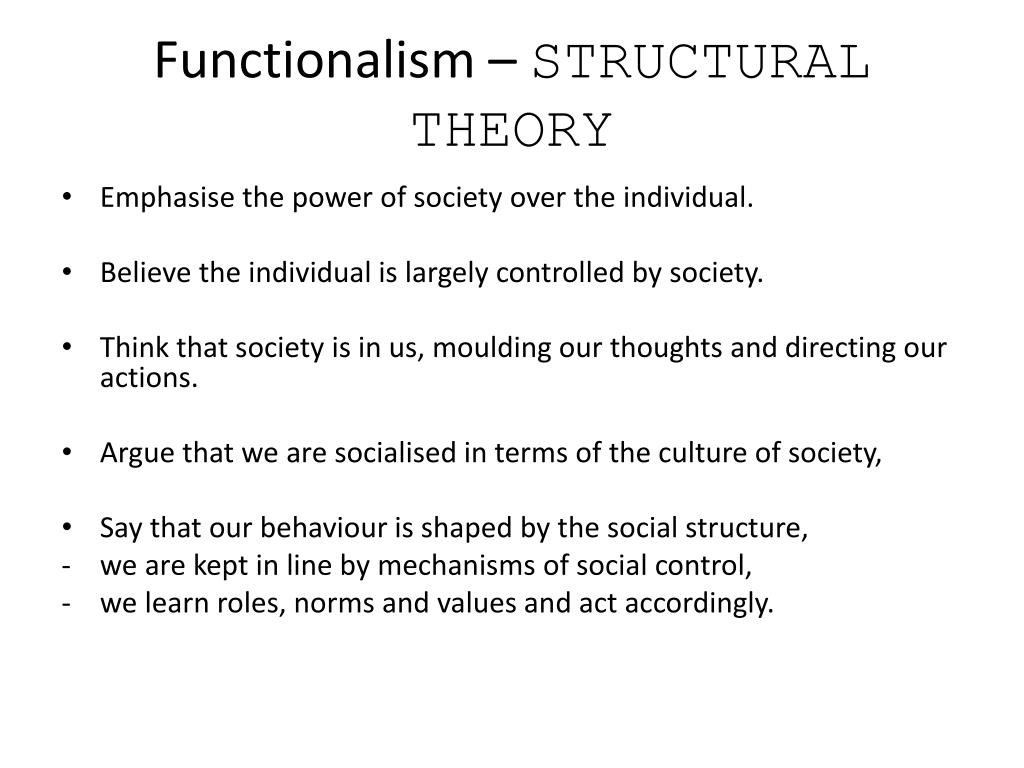Picture a complex machine, each part working in harmony to power the whole system. Now imagine that machine representing a society and its intricate web of social institutions. This is the essence of functional theory, a sociological perspective that explores how social structures and institutions contribute to the stability and functioning of society as a whole.

Image: jkfopt.weebly.com
Understanding functional theory is crucial for anyone interested in comprehending the dynamics of social life. It provides a framework for analyzing everything from the role of family in shaping individuals to the impact of the economy on cultural values. By exploring this theory, we can gain a deeper insight into the interconnectedness of social elements and the forces that drive social change.
Roots of Functional Theory: From Biology to Sociology
Functional theory’s roots lie in the 19th century, influenced by the biological analogy of the human body. Just as organs work together to maintain the body’s health, social institutions like family, education, and the law were seen as fulfilling essential functions to ensure societal stability. This early perspective, known as “organicism,” was developed by prominent sociologists like Herbert Spencer and Émile Durkheim, laying the groundwork for more nuanced functionalist thought.
Key Concepts: Building Blocks of Functionalism
1. Functionalism: The Big Picture
At its core, functionalism views society as a system of interconnected parts, each with a specific function. These functions contribute to the overall stability and survival of society. Think of it as a massive puzzle where every piece, from family structures to economic systems, plays a crucial role in the larger picture.

Image: www.pinterest.com
2. Social Institutions: The Working Parts
Functionalism focuses on the key social institutions that perform these vital functions, such as:
- Family: Provides socialization, stability, and emotional support for its members.
- Education: Transmits knowledge, skills, and cultural values to the next generation.
- Economy: Produces goods and services to meet societal needs.
- Politics: Creates and enforces laws, ensuring order and security.
- Religion: Provides moral guidance, social cohesion, and meaning in life.
3. Functions: The Roles They Play
Each institution fulfills various functions, both manifest (explicit and intended) and latent (unintended and hidden). For example, the manifest function of education is to provide knowledge and skills, while a latent function might be to promote social interaction and networking opportunities.
4. Equilibrium: Finding Balance
Functional theory emphasizes the importance of social equilibrium, where institutions work together in harmony to maintain stability. Disruptions to this equilibrium, such as societal conflict or rapid social change, can create instability and require adjustments to restore balance.
Real-world Applications: Functionalism in Action
Functional theory is not just an abstract concept; it has practical implications for addressing real-world social issues. For instance, understanding the functions of family can inform policies aimed at supporting families and preventing social problems. Exploring the functions of education helps us develop strategies to improve educational outcomes and access.
Examples:
- Economic Inequality: Functional theory may argue that economic inequality exists because it incentivizes ambition and hard work, ultimately benefiting society. Critics argue that this view ignores the negative consequences of inequality, such as social unrest and limited opportunities for marginalized groups.
- Criminal Justice: Functional theory suggests that crime serves a function in society, such as reinforcing moral boundaries or providing employment opportunities in law enforcement. However, this perspective can be seen as justifying or overlooking the harm caused by crime.
Criticisms and Contributions: A Balanced View
While functional theory offers valuable insights into social systems, it has been criticized for its limitations. Critics argue that:
- Overemphasis on Stability: Functionalism focuses primarily on maintaining societal order, neglecting the potential for conflict and social change.
- Ignoring Power Dynamics: The theory often fails to address how power imbalances and social inequalities can influence social structures and functions.
- Circular Logic: Some argue that it uses circular logic by explaining social phenomena based on their presumed functions, without providing evidence for their actual utility.
- Ahistorical Perspective: Functionalists tend to overlook the historical context and evolution of social institutions, focusing instead on their current functions.
Despite these criticisms, functional theory has made significant contributions to sociology by:
- Providing a Framework: It offers a helpful framework for understanding how social institutions contribute to the functioning of society.
- Highlighting Interconnectedness: Functional theory emphasizes the interconnectedness of social elements and the consequences of social change.
- Stimulating Debate: Its critiques and limitations have sparked fruitful debate and further development in sociological thought.
Moving Forward: Functionalism in Today’s World
While functional theory has evolved over time, it remains relevant in understanding contemporary social issues. Today’s interconnected world faces complex challenges such as globalization, technological advancements, and climate change, requiring a nuanced approach to social analysis. Functionalism can continue to be a valuable tool for examining the functions of social institutions in adapting to these challenges and seeking sustainable solutions.
Functional Theory In Sociology
Conclusion
Functional theory in sociology offers a powerful lens for understanding how social structures and institutions contribute to the functioning of society. While it has limitations, it provides a framework for exploring the complex interplay of social elements and the consequences of social change. As we navigate the complexities of the modern world, recognizing the functions of social institutions can help us develop strategies for achieving a more equitable and sustainable future.
Are you ready to delve deeper into the intricate workings of society? Explore further resources on functional theory, engage in discussions with other sociology enthusiasts, and share your insights on how functionalism shapes our understanding of the world around us.






